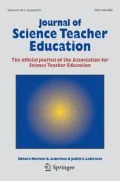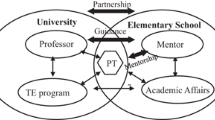Abstract
Mentoring is often an important component of alternative certification programs, yet little is known about what novices learn about science teaching through mentoring relationships. This study investigated the advice given by two mentor science teachers to their protégés. Findings indicate that mentors gave more advice related to general pedagogical knowledge than science-specific pedagogical content knowledge. Specifically, there was little to no advice related to the topics of inquiry, the nature of science, or the development of scientific literacy. Implications call for an increase in communication between university teacher education programs and school-based mentors, the development of benchmarks to help guide mentor–protégé interactions, and the importance of a multiyear induction process.

Similar content being viewed by others
References
Abell, S. (2006). Challenges and opportunities for field experiences in elementary science teacher preparation. In K. Appleton (Ed.), Elementary science teacher education: International perspectives on contemporary issues and practice (pp. 73–89). Mahwah, NJ: Erlbaum.
Abell, S. K., Dillon, D. R., Hopkins, C. J., McInerney, W. D., & O’Brien, D. G. (1995). “Somebody to count on”: Mentor/intern relationships in a beginning teacher internship program. Teaching and Teacher Education, 11, 173–188.
Awaya, A., McEwan, H., Heyler, D., Linsky, S., Lum, D., & Wakukawa, P. (2003). Mentoring as a journey. Teaching and Teacher Education, 19, 45–56.
Ballantyne, R., Hansford, B., & Packer, J. (1995). Mentoring beginning teachers: A qualitative analysis of process and outcomes. Educational Review, 47, 297–307.
Borko, H., & Mayfield, V. (1995). The roles of the cooperating teacher and university supervisor in learning to teach. Teaching and Teacher Education, 11, 510–518.
Borko, H., & Putnam, R. T. (1996). Learning to teach. In D. C. Berliner & R. C. Calfee (Eds.), Handbook of Educational Psychology (pp. 673–708). New York: Simon and Schuster Macmillan.
Brown, J. S., Collins, A., & Duguid, P. (1989). Situated cognition and the culture of learning. Educational Researcher, 18(1), 32–42.
Carter, M., & Francis, R. (2001). Mentoring and beginning teachers’ workplace learning. Asia-Pacific Journal of Teacher Education, 29, 249–262.
Chapelle, N., & Eubanks, S. (2001). Defining alternative certification and nontraditional routes to teaching: Similarities, differences, and standards of quality. Teaching and Change, 8, 307–316.
Chesley, L. S., Wood, F. H., & Zepeda, S. J. (1997). Meeting the needs of alternatively certified teachers. Journal of Staff Development, 18(1), 28–32.
Clandinin, D. J., & Connelly, F. M. (2000). Narrative inquiry: Experience and story in qualitative research. San Francisco: Jossey-Bass.
Connelly, F. M., & Clandinin, D. J. (1988). Teachers as curriculum planners: Narratives of experience. New York: Teachers College Press.
Danielson, C. (1999). Mentoring beginning teachers: The case for mentoring. Teaching and Change, 6, 251–257.
Dill, V. S. (1996). Alternative teacher certification. In J. Sikula (Ed.), Handbook of research on teacher education (2nd ed., pp. 932–957). New York: Macmillan.
Eifler, K., & Potthoff, D. E. (1998). Nontraditional teacher education students: A synthesis of the literature. Journal of Teacher Education, 49, 187–195.
Evertson, C. M., & Smithey, M. W. (2000). Mentoring effects on protégés’ classroom practice: An experimental field study. Journal of Educational Research, 93, 294–304.
Feiman-Nemser, S., & Remillard, J. (1995). Perspectives on learning to teach. In F. Murray (Ed.), The teacher educators’ handbook (pp. 63–91). San Francisco: Jossey-Bass.
Feistritzer, C. E. (1994). The evolution of alternative teacher certification. The Educational Forum, 58, 132–138.
Fenstermacher, G. D. (1990). The place of alternative certification in the education of teachers. Peabody Journal of Education, 67, 155–185.
Franke, A., & Dahlgren, L. O. (1996). Conceptions of mentoring: An empirical study of conceptions of mentoring during the school-based teacher education. Teaching and Teacher Education, 12, 627–641.
Graham, P. (1993). Curious positions: Reciprocity and tensions in the intern/cooperating teacher relationship. English Education, 25, 213–230.
Gratch, A. (1998). Beginning teacher and mentor relationships. Journal of Teacher Education, 49, 220–227.
Hargreaves, A., & Fullan, M. (2000). Mentoring in the new millennium. Theory Into Practice, 39(1), 50–56.
Hawkey, K. (1998). Mentor pedagogy and student teacher professional development: A study of two mentoring relationships. Teaching and Teacher Education, 14, 657–670.
Kay, R. S. (1990). A definition for developing self-reliance. In T. M. Bey & C. T. Holmes (Eds.), Mentoring: Developing successful new teachers (pp. 25–37). Reston, VA: Association of Teacher Educators.
Lave, J., & Wenger, E. (1991). Situated learning: Legitimate peripheral participation. Cambridge, MA: Cambridge University Press.
Loughran, J., Mulhall, P., & Berry, A. (2004). In search of pedagogical content knowledge in science: Developing ways of articulating and documenting professional practice. Journal of Research in Science Teaching, 41, 370–391.
Magnusson, S., Krajcik, J., & Borko, H. (1999). Nature, sources, and development of pedagogical content knowledge for science teaching. In J. Gess-Newsome & N. G. Lederman (Eds.), Examining pedagogical content knowledge (pp. 95–144). Dordrect, The Netherlands: Kluwer Academic Publishers.
McIntyre, D. J., Byrd, D. M., & Foxx, S. M. (1996). Field and laboratory experiences. In J. Sikula (Ed.), Handbook of research on teacher education (2nd ed., pp. 171–193). New York: Macmillan.
McKibbin, M., & Ray, L. (1993). A guide for alternative certification program improvement. The Educational Forum, 58, 201–208.
Miles, M. B., & Huberman, A. M. (1994). An expanded sourcebook: Qualitative data analysis (2nd ed.). Thousand Oaks, CA: Sage.
National Research Council. (1996). National science education standards. Washington, DC: National Academies Press. (http://www.nsta.org/main/pdfs/NSTAstandards2003.pdf).
National Science Teachers Association. (2003). Standards for science teacher preparation. Retrieved June 20, 2004, from http://www.nsta.org/pdfs/NSTAstandards2003.pdf
Polkinghorne, D. E. (1995). Narrative configuration in qualitative analysis. International Journal of Qualitative Studies in Education, 8, 5–23.
Rogoff, B. (1990). Apprenticeship in thinking: Cognitive development in social context. New York: Oxford University Press.
Shulman, L. S. (1986). Those who understand: Knowledge growth in teaching. Educational Researcher, 15(2), 4–14.
Shulman, L. S. (1987). Knowledge and teaching: foundations of the new reform. Harvard Educational Review, 57(1), 1–22.
Spradley, J. P. (1980). Participant observation. New York: Holt, Rinehart, and Winston.
Stanulis, R. N. (1994). Fading to a whisper: One mentor’s story of sharing her wisdom without telling answers. Journal of Teacher Education, 45, 31–38.
Strong, W., & Baron, W. (2004). An analysis of mentoring conversations with beginning teachers: Suggestions and responses. Teaching and Teacher Education, 20, 47–57.
Van Driel, J. H., Verloop, N., & de Vos, W. (1998). Developing science teachers’ pedagogical content knowledge. Journal of Research in Science Teaching, 35, 673–695.
Wang, J. (2001). Contexts of mentoring and opportunities for learning to teach: A comparative study of mentoring practice. Teaching and Teacher Education, 17(1), 51–73.
Author information
Authors and Affiliations
Corresponding author
About this article
Cite this article
Upson Bradbury, L., Koballa, T.R. Mentor Advice Giving in an Alternative Certification Program for Secondary Science Teaching: Opportunities and Roadblocks in Developing a Knowledge Base for Teaching. J Sci Teacher Educ 18, 817–840 (2007). https://doi.org/10.1007/s10972-007-9076-1
Accepted:
Published:
Issue Date:
DOI: https://doi.org/10.1007/s10972-007-9076-1




